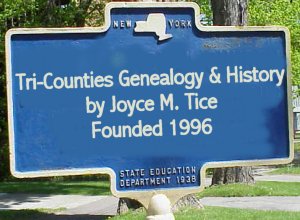 |
Tri-Counties Genealogy &
History by Joyce M. Tice
 |
Schools In Our Area |
 |
|
 |
|
Bradford County PA
|
Chemung County NY
|
Tioga County PA
|
|
|
|
Joyce's Search Tip - November 2008
 |
Do You Know that you can search just the
700
pages of School Records on the site by using the Schools button
in the Partitioned search engine at the bottom of the Current
What's New Page? You can narrow your search by entering a
township name and a surname and using the Find All Words option |

|
These articles about the early Teachers' Institutes and Common Schools
give us insight into early educational practices. They are part of research
I am compiling to write about Teaching the Teachers before colleges were
available for their education. Joyce M.Tice
Tioga Agitator, September 22, 1874
Our Common Schools
By Charles G. Gray
Our School Houses
Architects have seemingly vied with one another in getting up plans
for beautiful college buildings and elegant universities.--Every convenience
and ornamental design that could be invented has been adopted almost instantly.
This is all right, but who not do something for the improvement of country
school buildings? It is true we have better school houses than we
had forty years ago, but they yet lack a great deal of being what they
ought to be. The primitive log house has been torn down and a
poorly planned structure placed on the old foundation.
The old house has given place to the new, but the latter is deficient
in many respects. There are a great many objections to those now
in use. They seem to have been built without any special plan for
either comfort or convenience. When looking at one, the idea will
suggest itself that the people needed a place for the children to gather
together and study their lessons, and so they appropriated a certain amount
of money to defray the expenses of building, and were not very particular
about the manner in which it was expended. I said the idea would
suggest itself, and my reason for so saying was that a great many have
cost enough, but are rendered objectionable because the plan was bad.
Many school officers feel this defect and a conference of Superintendents
held at Williamsport recommended "that the Directors should submit their
plans to the County Superintendent, before building school houses."
While speaking of the necessity of better constructed school buildings
a school officer says: "If past Superintendents had been consulted
they would have advised the construction of buildings differently arranged
from many that are at present in use in the county, and which could have
been erected without additional expense."
The above touches the exact point aimed at Directors need not expand
much more money in putting up a school edifice than they have been in the
habit of doing, but should exercise a little more judgment in its expenditure.
Any one who will think a moment knows that a house without a vestibule
is not up to the proper standard. Scholars coming into the school
room during this winter must brush the snow off their clothing and stamp
it, as best they can, from their feet, disturbing the school every time
it is repeated.
Think how unhealthful it is for twenty, thirty, or forty scholars to
be boxed up in a common sized school room with no means of ventilation.
How long would the same number of men and women submit to such treatment?
And yet where is the school house in Tioga county that has any means of
ventilation save through the cracks and crevices, or perchance a broken
window pane?
The arrangement of seats and recitation benches in many is very poor.
The graded school house at Covington is a fair sample in this respect.
No provision was ever made for a recitation seat, unless it was intended
the recitation should be conducted in front of the blackboard and directly
under the stovepipe. In order to keep the room warm during an average
winter day the stovepipe must emit so much heat that it is next to impossible
for scholars to sit under it, and if they could, the dust from the blackboard
would put a miller's stamp on every one.-- Then the seats are so
constructed that no one can stand up in them, but must bend the knees forward
in an uncomfortable position.
I might go on and point out other defects in the structure of the majority
of our common school houses, but for brevity's sake will not.
We are in need of better houses and in time will get them. Our
citizens are beginning to realize that the hope and honor of our country
is centered in our common school system, and we shall have better facilities.
Tioga Agitator October 13, 1874
OUR COMMON SCHOOLS
By Charles G. Gray
VI -- Reading Teachers
It is a lamentable fact the newspapers are not read as they should
be by the people generally. Too many think money given to the printer
is thrown away.
Go where you will and you will find the man of newspapers a man of
influence. His opinion when given is counted of worth.--His advice
is solicited every day. People expect the reading man will know all
about this movement or that, and when they desire as explanation they ask
him. This not only gives him an influence but does wonders for his
memory.
Teachers especially ought to be inveterate newspaper worms. They
cannot continue to be posted on educational matters and keep pace with
the times unless they read the papers. Education is continually progressing
and its advocates must not lose step or they will fall behind. Once
in the rear and it is hard to overtake and attempt to lead progressive
education. Everything pertaining to school matters is of such a changeable
nature that unless the press is consulted regularly the teacher remains
in ignorance of many things.
It has for a long time been a mystery to me why so many teachers shun
the periodicals of the day. Are they afraid the papers will convince
them of their ignorance? The press of the country is the teacher's
friend, and why refuse to clasp the hand, that is so willing to give substantial
aid to the hard-working educator.
Once while visiting a lady teacher I asked for a newspaper. She
handed me a third rate religious paper. After glancing over the columns
filled with worn-out extracts from other papers, I asked for a copy of
the Agitator.
"We don't take it."
"Please let me look over your last Pennsylvania School Journal?"
"I never read that magazine much, nor do I care enough for it to subscribe."
Thus she gave me her opinion of the teachers organ.
"Surely you take a staunch weekly paper," said I.
"No, we only take this paper published by direction of the church to
which father belongs."
Just think of this! A teacher, the daughter of a farmer worth
ten thousand dollars, and not the subscriber to any paper of worth.
"Is our civilization a failure? Or is the Caucasian played out?"
I made up my mind that she would never astonish the world with her
advanced theories of theaching.
While talking of school matters with a teacher who had been in the
profession over ten years, I mentioned an article which I had read in the
Pennsylvania School Journal. She had heard of this organ but had
never seen a copy.
Teacher, by all means read the papers. If you have no taste of
them, cultivate a taste. Read your county and village papers; subscribe
for an educational journal; read a good sound city paper. Don't neglect
your best interests. Hand in hand with the printers let us march
on the road of improvement, and finally the services of the true teacher
will be better appreciated. Some of you will say that your pay is
so small you cannot afford to buy newspapers. I agree with you that
you
are but poorly paid; but you can afford the reading matter. Wear
your dresses a little after you think they are beginning to appear shabby,
and purchase a cheaper hat. Gentlemen of the profession, take your
boots to the cobbler and get him to patch them, and wear your coat awhile
after it becomes seedy; but by all means "Take the papers."
Tri-Counties Page 16338
|
Bradford County PA
|
Chemung County NY
|
Tioga County PA
|
|
Published On Tri-Counties Site On 23 SEP 2008
By Joyce M. Tice
Email: Joyce M. Tice

|
 |
|
Gazette & Bulletin, Williamsport, PA, Saturday morning,
30 Oct. 1937
Annual Sessions Held by Teachers and Directors of Tioga
County Schools
WELLSBORO - Addresses by prominent educators were highlights of the
70th annual Tioga County teachers’ meeting and the annual school directors’
convention. Both were held here Thursday and Friday.
Officers of the School Directors Association of Tioga County
were elected as follows: President, Mrs. Mae Smith of Elkland; first vice
president, Frank Snyder of Liberty; second vice president, A.H. Vosburg,
Mansfield; secretary, Mrs. Clara MacIntosh of Covington; treasurer, Fay
Furman of Wellsboro.
Salom Rizk, lecturer, spoke on “Americanization of an American”
at a meeting of the teachers in the high school Thursday morning.
Sectional meetings, followed by panel discussions were led by
the following: Irving T. Chatterton, on English; Dr. Paul J. Steele, science;
Miss May M. Mattson, home economics; George S. Howard, music, all of the
Mansfield State Teachers College faculty.
The afternoon addresses were given by Dr. Joseph F. Noonan, president,
Mansfield Teachers College, and Florence Hale, lecturer and editor.
Preston O. VanNess, executive secretary of the
state directors’ association, E.A. Quackenbush, of the department
of public instructions, and Mr. Rizk, addressed the school directors.
Music was furnished by the Mansfield Girls’ Glee Club, directed
by Miss Eleanor Barnard; the Wellsboro High School Band, and instrumental
quintet and pupils of the Charleston grade school. Mrs. Catherine McClintock,
Wellsboro, led group singing.
Dr. Hilton Ira Jones, scientist and lecturer, was the only new
speaker at yesterday’s meeting of teachers.
Entertainment was provided by the Wellsboro High School Orchestra;
a baritone solo by Ronald Walter of Tioga; dances by Wellsboro High School
girls in charge of Miss Jane Farwell; selections by Sophomore Girls’ Glee
Club of Wellsboro, and vocal solo by Lane Webster, Wellsboro.
Approximately 300 persons attended the two-day sessions, at the
close of which the following officers were elected by the Tioga County
Tuberculosis Society: President, Rock L. Butler, Wellsboro; vice president,
Walter G. Clark, Westfield; secretary-treasurer, Mrs. C.E. Bennett, Wellsboro;
auditors, Edgar Brandt, Wellsboro, and R.D. English, Antrim; delegates
to P.S.E.A. convention, Warren L. Miller, Mansfield,
Miss
Josephine Squires and J.G. March, Wellsboro. Officers of the
county unit were elected as follows: President, Rock L. Butler; secretary-treasurer,
Miss Eleanor Donovan, Elkland.
